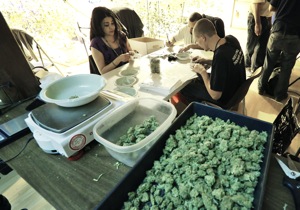ATLANTA - Medical marijuana has been a nonstarter in recent years in the Deep South, where many Republican lawmakers feared it could lead to widespread drug use and social ills. That now appears to be changing, with proposals to allow a form of medical marijuana gaining momentum in a handful of Southern states.
Twenty states and the District of Columbia have legalized medical marijuana, and this year powerful GOP lawmakers in Georgia and Alabama are putting their weight behind bills that would allow for the limited use of cannabis oil by those with specific medical conditions.
The key to swaying the hearts of conservative lawmakers has been the stories of children suffering up to 100 seizures a day whose parents say they could benefit from access to cannabidiol, which would be administered orally in a liquid form. And proponents argue the cannabis oil is low in tetrahydrocannabinol, or THC, the psychoactive compound in marijuana that makes users feel high. Evidence of its effectiveness in these cases is anecdotal.
“I’m an unlikely champion for this cause,” said Georgia Rep. Allen Peake. “Once people realize it’s not a 6-year-old smoking a joint, most folks realize this is the compassionate thing to do.”
Peake’s bill has already earned the backing of more than 80 state lawmakers, including several members of the House Republican leadership who signed on as co-sponsors, and the state’s largest professional association of doctors. The bill would revive a long-dormant research program allowing academic institutions to distribute the medical cannabis and would be “limited in scope, tightly restricted, well-regulated and managed by doctors,” Peake said.
Alabama Rep. Mike Ball is behind a bill that would allow people to possess the cannabis oil if they have certain medical conditions. It passed a key committee vote on Wednesday.
“The public is starting to understand what this is,” said Ball, chairman of a powerful House committee and a prominent voice on law-enforcement issues. “The political fear is shifting from what will happen if we pass it, to what might happen if we don’t,” Ball said.
In Louisiana, although a bill has yet to be introduced, a recent committee hearing at the Capitol on legalizing medical marijuana drew a standing-room-only crowd, and Gov. Bobby Jindal made comments last month indicating he was willing to consider it.
“When it comes to medical marijuana … if there is a legitimate medical need, I’d certainly be open to making it available under very strict supervision for patients that would benefit from that,” Jindal said, according to a report in The Advocate.
Technically, both Georgia and Louisiana have laws on the books from the 1980s and 1990s that allow for the use of medical marijuana, but those programs essentially ended before they could start.
In Mississippi, Republican state Sen. Josh Harkins of Brandon is sponsoring a cannabis oil bill similar to the ones in Alabama and Georgia. Harkins said one of his constituents has a 20-month-old daughter with Dravet syndrome, a form of pediatric epilepsy, and the oil can help reduce the number of seizures.
Elsewhere, both Kentucky and Tennessee have medical marijuana bills under consideration, although they have yet to gain traction. Kentucky Senate President Rover Stivers, R-Manchester, has said he’s not convinced marijuana has legitimate medical uses.
In Florida, it’s likely to become a campaign issue in the fall, given that Gov. Rick Scott is up for re-election and a proposed constitutional amendment will be on the ballot that would allow for the medical use of marijuana as determined by a licensed physician.
Meanwhile, Alabama Gov. Robert Bentley has signaled a willingness to discuss medicine that might be derived from marijuana with appropriate federal regulation.
“If someone wants to use the medicine that is in marijuana, go through the same testing that you have to go through when you do that through the [U.S. Food and Drug Administration], you go through all of that, do the testing, the drug testing, that’s fine,” Bentley said last month. “I have no problem with that. I am not just for prescribing marijuana.” Information for this article was contributed by Kim Chandler, Emily Wagster Pettus, Bruce Schreiner, Brendan Farrington, Ray Henry and Melinda Deslatte of The Associated Press.
Front Section, Pages 2 on 02/10/2014
